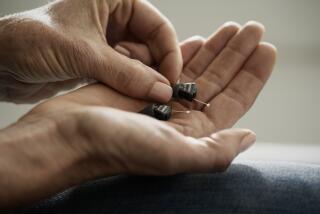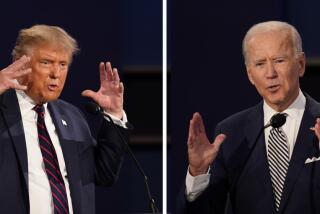The Silent Stigma : Many Elderly Tend to Ignore or Deny That Hearing Fades as the Years Mellow
- Share via
The elderly woman at the coffee shop counter ordered a roll.
“Would you like me to heat it for you?” the waiter asked. And then wondered at the puzzled look he got in return.
What the customer thought she had heard, relates Dr. John W. House, was: “Would you like me to eat it for you?”
House, president of the nationally recognized House Ear Institute here, is accustomed to such stories and doesn’t find them that funny because, he said, they are indicative of a sad fact in the United States: Loss of hearing is America’s largest, yet least recognized, physical ailment in people of all ages, but most particularly among the elderly.
“About one in three people age 60 or older have some degree of hearing impairment,” House estimated.
And, he pointed out, while most elderly people don’t think twice about taking medication to regulate blood pressure or getting glasses to improve their eyesight, many will head for their graves in a state of deafness rather than be seen wearing a hearing aid.
“It may boil down to the feeling that as long as one can practice denial of hearing loss, one can deny aging,” House said.
This false preservation of pride, however, can result in devastating isolation and withdrawal for some elderly. “The person, for example, may stop going to church because he or she can’t hear the sermon, or can’t talk with fellow churchgoers,” the otologist said. “The person may stop going to social activities.”
Such a reaction isn’t new. When the 19th-Century Spanish painter Goya found himself going deaf at age 70, he retired to his villa, where he executed somber paintings of macabre subjects on his walls.
President Reagan, however, faced the problem a different way. House’s most famous patient agreed five years ago, at the age of 72, to begin wearing a hearing aid, not because of age but because of a work-related accident.
During his film career, a .38-caliber blank was fired near Reagan’s right ear, resulting in a gradual deterioration in his hearing.
“During an examination in my office, he said that he was having difficulty hearing at Cabinet meetings, or when he met with individuals who tended to mumble, or when he met with some foreign dignitaries who had accents,” House said.
“I told him I felt he would benefit by a hearing aid, but I was prepared for an argument. He was coming up for re-election, and I was concerned that he would ask for a postponement.
“Instead, he said: ‘Doctor, do you think it will help?’
“I said I thought it would.”
“He replied: ‘Let’s go.’ ”
Once the President was seen in public wearing a hearing aid, “sales nationally for that year went up 75% over the previous year,” House said.
And two years later, this time because of hearing loss in the other ear from what House said was related to aging, Reagan agreed to wear another hearing aid in his other ear to achieve balance.
So given the fact that such other notables as U. S. Surgeon General C. Everett Koop, actors Richard Thomas, Jimmy Stewart and Eddie Albert are among the estimated 4 million Americans who wear hearing aids, why the not-me attitude among so many, especially the elderly?
One answer came from Washington, at Gallaudet University, the only liberal arts university in the world for the hearing-impaired.
Carol S. Cober, the coordinator of Special Populations Program of the National Academy there, said by phone that the resistance to admitting to having a hearing problem may result from the fact that, in the United States, there is a stigma about growing older.
“Some say they might as well get a rocking chair and sit on the front porch, because they would assuredly be certified as old,” House added. “You hear someone 80 years old say, ‘I’m not old enough for a hearing aid.’ ”
“And because hearing loss affects communication, there may be an implication that it is a disability which also affects intelligence,” Cober said. “In other words, deaf and dumb is sometimes interpreted as deaf and stupid.
Progressive Loss
“With the elderly, hearing loss is usually progressive--it grows over time, as opposed to sudden deafness which may have been caused by an accident, high fever, medications.
“Therefore, since the change occurs subtly, the person often will blame others--perhaps feel someone is mumbling too much. And frequently that other person is the spouse.”
Cober is ELDERHOSTEL coordinator for the Gallaudet site. This is a program for people age 60 or older, many of them hearing-impaired, who spend a week living on a campus, taking courses such as “Adjustment to Hearing Loss.”
“Many people in these programs mention the marital stress that the resultant communication problem can cause,” Cober said. “The wife, for instance, may be in the kitchen, wanting to know if her husband wants potatoes with the meal. But to find out, she has to walk to the living room and get into his visual field. He can’t hear her question.”
Eyeglasses Acceptable
An elderly person’s stubborn refusal to admit to the problem also may be because “to some, a hearing aid isn’t an acceptable prosthesis,” said Dr. William McFarland, audiologist with the House Institute. “Eyeglasses are acceptable because they can be stylish. A hearing aid has no cosmetic appeal.”
Marcella M. Meyer, executive director of the Greater Los Angeles Council on Deafness and president of the California Assn. of the Deaf, pointed out that “when you see a blind person, you invariably have an emotion of sympathy.”
But Meyer, who has been deaf since suffering scarlet fever at age 6, said through a sign-language interpreter that “if I run into a person who doesn’t know I am deaf, and I am not able to respond, there often is a negative reaction.”
On the other hand, as House also pointed out, “many who are hearing-impaired don’t realize it. They often aren’t aware that they have missed anything.”
One increasingly popular but little-publicized solution--even being used as a supplementary help by some who already wear hearing aids--is rooted in the 16th Century. But only now has it become trendy to say: Read my lips.
“I starting attending the weekly lip-reading class a couple years ago,” 67-year-old Robert Hill recalled. “I found myself not hearing well, and a friend invited me to come along with her.
“I find I don’t need a hearing aid--this gets the job done. The only drawback is that people sometimes are disconcerted during a conversation when you concentrate on their lips rather than their eyes.
“You get the feeling they are thinking: ‘My uppers must be falling down.’ It’s like meeting Count Dracula and finding him staring at your jugular.”
For more than a quarter of a century now, at the Pasadena Senior Center, Francine Hokin Katz has held forth on the fine art of being able to determine what a person is saying by watching the mouth, then figuring out what words are being formed. She teaches similar lip-reading courses through Pasadena City College.
On this particular Wednesday morning at the center, 30 students, mostly seniors, some wearing hearing aids, were seated on folding chairs.
Katz began the two-hour lesson by taking them through an eye drill that involved writing down their guesses on the order in which she silently mouthed the words fun-bun-sun and those-chose-rose.
A Guessing Game
“During a conversation, a lot of it is a guessing game,” 72-year-old Florence Everett of Pasadena said during a break. “And if you guess wrong, your answer can draw a strange look.”
Another student, 74-year-old Hal Cleworth of Temple City, graded television personalities on the readability of their lips: “Barbara Walters is difficult--a wonderful interviewer, but she hardly ever moves her lips. Mary Hart of ‘Entertainment Tonight’ is better than anyone.”
Porter Smalley, 67, of Pasadena, pointed out that in the movies in particular: “It’s amazing how many people talk as if they were ventriloquists, trying not to move their lips.” “Katharine Hepburn’s lips were great for reading,” he said, adding that Marilyn Monroe’s lips, if anyone was looking at them, were not.
Helen Shaw of Altadena, age 91 and still appearing in movies (she has one upcoming that stars Bette Davis), said part of the challenge of lip reading, when faced with look-alike words, is to make an association to logically discover the meaning and balance of the sentence.
“Take the words buy and pie and my ,” she explained. “If said in a grocery store, the word is probably buy . If in a restaurant, probably pie . If the talk is about a baby, the word is probably my .”
Listens to Watch
Florence Cardwell of Pasadena, who is 78, said she was attending the class in anticipation of possibly having a hearing problem some day. “I know I don’t now,” she said, “because I test myself almost daily by listening to my wristwatch.”
Katz, who has been a speech pathologist for 34 years, said before the two-hour class that presbycusis, the gradual loss of acute hearing with advancing age, usually begins around 50 and continues as an invisible handicap. Often the elderly fake hearing, she observed.
She said that her answer to the problem, lip reading, is in some quarters controversial because of the fact that “60% of what is said isn’t visible; only 40% is shown with the lips.
“However, I have seen elderly people not only use the method to deal effectively with hearing loss, but also--because of the strong concentration it requires--they don’t deteriorate mentally.
“They must try to fit a puzzle together. The challenge is getting the message. First they see it, then they have to take what is seen and make sense of it. They have to mentally fill in what isn’t seen.”
In defense of those hearing-impaired who take refuge in the excuse that others are mumbling too much, Katz said: “We do live in a rushed society, and we do speak too rapidly. This happens to be one of the disadvantages of lip reading--the eye doesn’t pick up sound as fast as the ear can hear it.
Ear Faster Than Eye
“The eye can see only eight or nine sounds per second from the lips; the normal ear can pick up 13 to 14 sounds per second.”
Also, of course, the speaker must be facing the other person, and be in a lighted area.
But while this method can have difficulties, other solutions for the hearing impaired have drawbacks of their own:
- Sign language: This is most commonly used by the congenitally deaf--as Meyer explained, prelingual, those who became deaf before developing a language. However, regarding this manual communication, as Gallaudet points out in a booklet, “many deafened adults reject using sign language because their relatives, friends and colleagues do not use it. But sign language provides the opportunity for richer, easier communication with those who do use it.”
Added Katz: “Also, if you have been trained to use it, as you get older it may be harder to form your fingers into signs, because of arthritis.”
Dogs Trained to Help
- Hearing dogs. This is a program developed by the San Francisco SPCA, providing dogs trained to alert an individual to specific sounds, such as a door bell, a baby’s cry, a smoke alarm. The program has been highly successful--but obviously only useful for a hearing-impaired person living in a dwelling where a dog is permitted.
But all of the above also have things going for them. As lip reader Smalley said: “At least I can go to the theater now--I just have to make sure I sit up front enough so that I can make out the actor’s lips.”
He and his fellow practitioners sometimes say they can’t hear a thing without their glasses.
But with all these remedies, as it were, the resistance to facing up to the impairment so often associated with aging remains. McFarland sees something of a life cycle in the use of a hearing aid.
“Children are more easily convinced to wear them, at least until the teen years. Then they become self-conscious--until they reach the age when wearing one may make a difference in their careers. Then comes old age, and the reluctance again.”
Indeed, the results can be poignant. Katz recalled a woman in her late 70s, who declined to wear a hearing aid and who showed up at the lip-reading class two years ago in tears: “She said that, after a long marriage, her husband had left her because he had no more patience with her loss of hearing. Now she is a different woman. She goes around with a smile on her face.”
Usually, the speech pathologist said, “elderly women aren’t as embarrassed as men to admit a hearing problem and to do something about it. Maybe it’s because we women enjoy talking more.”
House said it isn’t uncommon for a husband to protest: “I don’t want to be here, but my wife made the appointment.”
Missing Out on Small Talk
Jascah Hirsch, 77, of Burbank, who wears a hearing aid in each ear, said: “I was driven to get them when I found I was missing out on the small talk the neighbors were making in the yard.”
The trend over the last five years or so, House said, is to have a hearing aid in each ear, rather than just wearing one: “You don’t see too many people wearing just one eyeglass. You need two hearing aids not only to help determine the direction of sound, but also because a pair of them helps tremendously in filtering out unwanted sounds.”
With all these solutions, however, the big problem would appear to be that after all is said and done, too often the advice falls on deaf ears.
More to Read
Sign up for Essential California
The most important California stories and recommendations in your inbox every morning.
You may occasionally receive promotional content from the Los Angeles Times.













